#Am Ostbahnhof
Explore tagged Tumblr posts
Video
Berlin Ostbahnhof by Pascal Volk
#Europe#Germany#Berlin#Berlin Friedrichshain-Kreuzberg#Friedrichshain#F'hain#Am Ostbahnhof#Ostbahnhof#Architecture#Architektur#arquitectura#Berlin East railway station#Train station#Bahnhof#Estación de ferrocarril#People#Menschen#Leute#Wide Angle#Weitwinkel#gran angular#super wide angle#Superweitwinkel#ultra wide angle#Ultraweitwinkel#ww#wa#sww#swa#uww
2 notes
·
View notes
Text
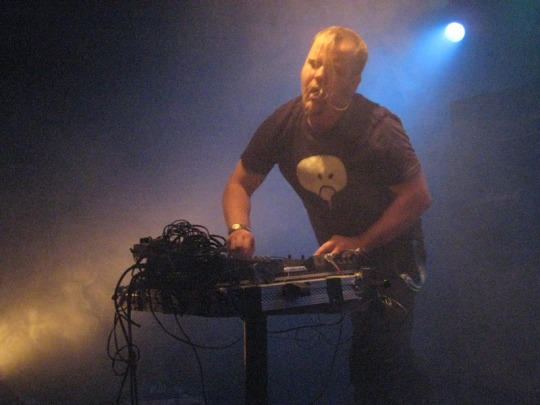
Birchville Cat Motel (Campbell Kneale) 28 January 2007, Transmediale 07, Club Maria am Ostbahnhof, Berlin, Germany
source: wikipedia 📸: jaimelesfraises
#photography#artist photography#Birchville Cat Motel#New Zealand#Campbell Kneale#Club Maria am Ostbahnhof#Berlin#Germany#2007
2 notes
·
View notes
Text

#sbahn #480560 als #s3 nach #erkner am #ostbahnhof
0 notes
Text

442 330 in Berlin am Ostbahnhof am 06.04.2025
#442 330#Br442#Br 442#Hamster#Hamsterbacke#Talent#Stadtbahn#Berlin-Ostbahnhof#Ostbahnhof#Friedrichshain#Friedrichshain-Kreuzberg#Berlin-Friedrichshain#eisenbahn#bahnhof#bahn#berlin#triebwagen
21 notes
·
View notes
Text
OOR 2009 - Nr 10 - Rammstein interview
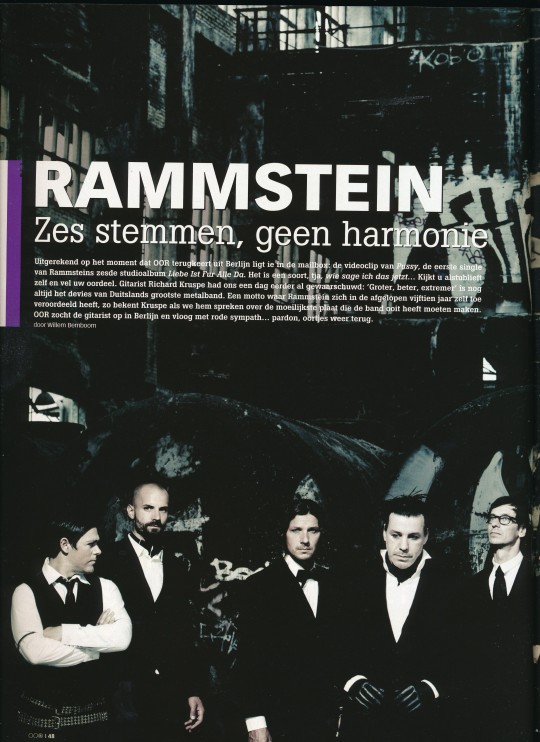
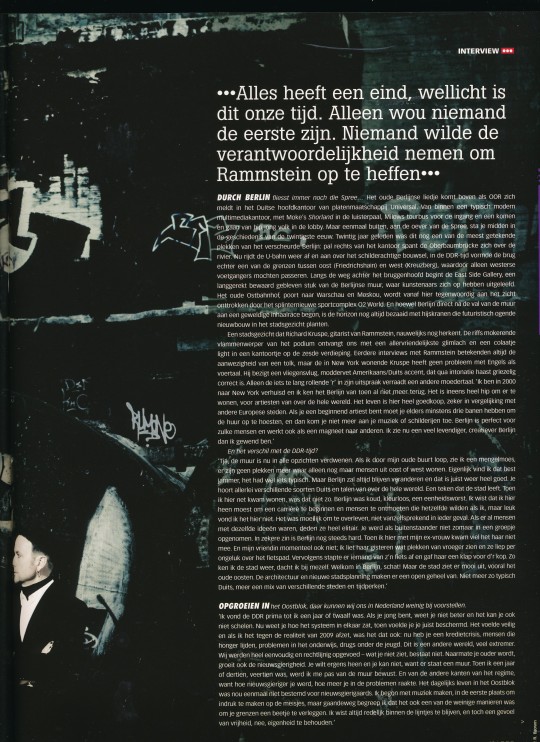
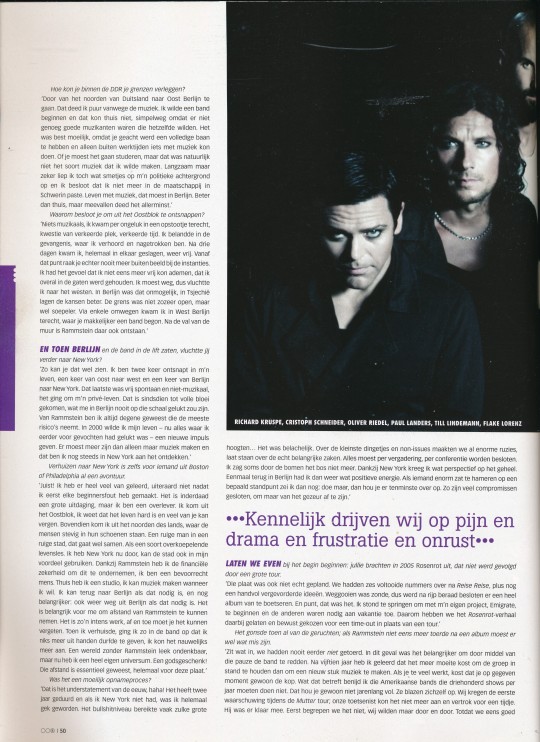
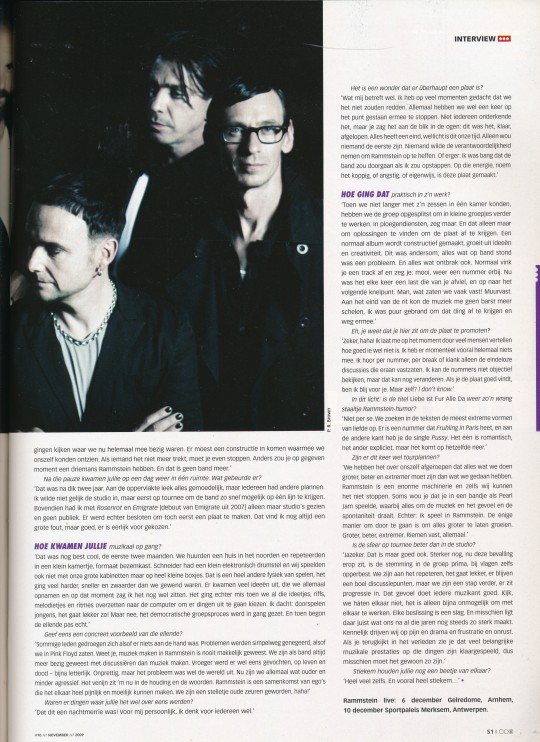
Rammstein
Six voices, no harmony
The moment OOR returns from Berlin it drops be in the mailbox: the video clip for Pussy, the first single from Rammstein's sixth studio album Liebe Ist Für Alle Da. It's a kind of, well, wie sage ich das jetzt... Please see for yourself and make your own judgement. Guitarist Richard Kruspe had already warned us the day before: "Bigger, better, more extreme" is still the motto of Germany's biggest metal band. A motto that Rammstein has condemned itself to over the past fifteen years, Kruspe admits when we speak to him about the most difficult record the band ever had to make. OOR visited the guitarist in Berlin and flew with red sympath... sorry, ears back.
by Willem Bemboom
Durch Berlin fliesst immer noch die Spree... The old Berlin song comes up when OOR reports to the German headquarters of record company Universal. Inside a typical modern multimedia office, with Moke's Shorland in the listening post, on the banks of the Spree, you are in the middle of the history of the twentieth century. Twenty years ago, this was one of the most scarred places in torn Berlin: directly to the right of the office, the Oberbaumbrücke spans the river. Nowadays the U-bahn runs back and forth over the picturesque building, but in GDR times the bridge formed one of the borders between east (Friedrichshain) and west (Kreuzberg), meaning that only western pedestrians were allowed to pass. Along the road behind the bridgehead begins the East Side Gallery, an elongated preserved part of the Berlin Wall, where artists have enjoyed themselves. The old Ostbahnhof, gateway to Warsaw and Moscow, is now hidden from view from here by the brand new O2 World sports complex. And although Berlin started a great catch-up race immediately after the fall of the wall, the horizon is still dotted with cranes that plant futuristic-looking new things in the cityscape.
A cityscape that Richard Kruspe, guitarist of Rammstein, hardly recognizes. The riff-slinging flamethrower from the stage welcomes us with the friendliest smile and a diet coke in an office on the sixth floor. Previous interviews with Rammstein always meant the presence of an interpreter, but Kruspe, who lives in New York, has no problem with English as the main language. He uses a lightning-quick, thick American/German accent, which is almost eerily correct in terms of intonation. Only the slightly too long rolling 'r' in his pronunciation betrays a different native language. "I moved to New York in 2000 and I no longer recognize the Berlin of that time. It has suddenly become very hip to live, for artists from all over the world. Life is very cheap here, especially compared to other European cities. If you are a starting artist you have to work at least three jobs elsewhere to pay the rent, and then you no longer have time for your music or paintings. Berlin is perfect for such people and also acts as a magnet to others. I now see a much more vibrant, creative Berlin than I am used to."
And the difference with the GDR period?
"Well, the wall has now disappeared in every respect. When I walk through my old neighborhood, I see a mix, there are no longer places where only people from the east or west live. I actually think that's quite a shame, it had something typical. But Berlin will always keep changing and that is a very good thing. You hear all kinds of different types of German and languages from all over the world. A sign that the city is alive. When I first moved here, that was not the case. Berlin was cold, colourless, generic. I knew I had to go here to start a career and meet people who wanted the same thing as me, but I didn't like it here. It was difficult to survive, not obvious in any case. If there were people with the same ideas, they acted very elitist. As an outsider you were not just accepted into a group. In a sense, Berlin is still hard. When I came here with my ex-wife, she did not like it And neither does my girlfriend at the moment; I showed her some places from the past yesterday and she accidentally walked on the bike path. Then someone got off his bike and hit her in the head. This way I know the city again, I thought to myself. Welcome to Berlin, baby! But the city looks beautiful, especially the old east. The architecture and new city planning make it an open whole. Not so typically German anymore, more a mix of different cities and eras."
Growing up in the Eastern Bloc is something we in the Netherlands can hardly imagine.
"I thought the GDR was fine until I was about twelve. When you're young, you don't know any better and you don't care. Now you know how the system worked, then you felt protected. safe and if I compare it to the reality of 2009, it was: now you have a credit crisis, people going hungry, problems in education, drugs among the youth. This is a different world, much more extreme. We had a very simple and straightforward upbringing - what you don't see doesn't exist. As you get older, your curiosity also grows. You want to go somewhere and you can't, because there is a wall. Only when I was about thirteen or fourteen, I became aware of the wall. And of the other sides of the regime, because the more curious you were, the more you got into trouble. Daily life in the Eastern Bloc was simply not meant for the curious. I started making music, primarily to impress the girls, but gradually I understood that it was also one of the few ways to push your boundaries a little. I always managed to stay within the lines, and then maintain a sense of freedom, no, individuality."
How were you able to push your boundaries within the GDR?
"By moving from the north of Germany to East Berlin. I did that purely because of the music. I wanted to start a band and that wasn't possible at home, simply because there weren't enough good musicians who wanted the same. It was quite difficult, because you were expected to have a full-time job and could only do something with music outside working hours. Or you had to study it, but that was of course not the kind of music I wanted to make. Slowly but surely I started to get some blemish on my political background and I decided that I no longer fit into society in Schwerin. Living with music, it had to be in Berlin. Better than at home, but it was not easy at all."
Why did you decide to escape the Eastern Bloc?
"Nothing musical, I accidentally got into a disturbance, a matter of wrong place, wrong time. I ended up in prison, where I was interrogated and investigated. After three days I was released again, completely beaten up. From that point, you will never be out of the picture of the authorities again. I had the feeling that I could no longer even breathe freely, that I was being watched everywhere. I had to leave, so I fled to the west. That was impossible in Berlin, The chances were better in the Czech Republic 1). The border was not so much open, but more flexible. Via some detours I ended up in West Berlin, where it was easier to start a band. After the fall of the wall, Rammstein was also founded there."
And when Berlin and the band were on the rise, you fled to New York?
"You can look at it that way. I have escaped twice in my life, once from east to west and once from Berlin to New York. The latter was quite spontaneous and non-musical, it was about my private life. That has since blossomed into full bloom, which I would never have achieved on that scale in Berlin. From Rammstein I have always been the one who takes the most risks. In 2000 I wanted my life - now I achieved everything i fought for previously - to give a new impuls. There had to be more than just making music and I am still discovering that in New York."
Moving to New York is an adventure even for someone from Boston or Philadelphia.
"Right! I learned a lot from it, of course not after making every rookie mistake. It is indeed a big challenge, but I am a survivor. I come from the Eastern Bloc, I know that life is hard and a lot of you can take. Moreover, I come from the north of the country, where people are on their feet. A rough man in a rough city, that fits. It's a kind of overarching life lesson. I understand New York now, I can use the city to my advantage. Thanks to Rammstein I have the financial security to do this, I am a privileged person. I have a studio at home, I can make music whenever I want. I can go back to Berlin if I need to, and even more important: leave Berlin again if necessary. It is important for me to be able to distance myself from Rammstein. It is such intense work, sometimes you have to be able to forget it. When I moved, I was so caught up in the band that I no longer dared to hand anything over, I could hardly handle it anymore. A world without Rammstein seemed unthinkable, but now I have a universe all my own. A godsend! That distance has been essential, especially for this record."
Was it a difficult recording process?
"That's the understatement of the century, haha! It took two years and if I didn't have New York, I would have gone completely crazy. The level of bullshit often reached such great heights... It was ridiculous. We already had huge arguments about the smallest things and non issues, let alone about the really important matters. Everything had to be decided per meeting, per conference. Sometimes I was completely overwhelmed. Thanks to New York, I gained some perspective on the whole thing. Once back In Berlin I had some positive energy again. If someone was really insisting on a certain point of view, I would say: do it, at least you'll stop talking about it. In this way, many compromises were made just to end the whining."
Let's start at the beginning: you released Rosenrot in 2005, which was not followed by a major tour.
"That record wasn't really planned. We had six completed songs left after Reise Reise, plus a handful of advanced ideas. Throwing it away would be a shame, so after careful consideration it was decided to sculpt a whole album out of it. And that was it. I was eager to start my own project, Emigrate, and the others needed a holiday. That's why we left the Rosenrot story at that and consciously opted for a time-out instead of a tour."
Rumors were buzzing then; if Rammstein didn't even tour anymore after an album, something had to be wrong.
"The thing was, we had never not toured before. In this case it was more important to save the band through that break. After fifteen years I have learned that it takes more effort to maintain the group than to to create a new piece of music. If you work too much, it will cost you at some point. In that respect, I don't envy those American bands that have to do three hundred shows a year. You just can't keep that up for years. They blow themselves up. We got the first warning during the Mutter tour; our keyboard player couldn't handle it anymore and left for a while. He was done with it. At first we didn't understand it, we just wanted to keep going and going. Until we took a closer look at what we were doing. There had to be a construction that would allow us to spare ourselves. If someone can't handle it anymore, you have to stop for a while. Otherwise, at some point you would have a three-man Rammstein. And that is no longer a band. "
After that break, one day you ended up in the same room again. What happened?
"That was after about two years. On the surface everything seemed pleasant, but everyone had other plans. I didn't want to go straight into the studio, but first go on tour to get the band on the same page as quickly as possible. Moreover, with Rosenrot and Emigrate [Emigrate's 2007 debut] I only saw studios and no audience. However, it was decided to make a record first. I still think that was a big mistake, but hey, it was an honest choice."
How did you get started musically?
"That was quite cool, the first two months. We rented a house in the north and rehearsed in a small room, the size of a broom cupboard. Schneider had a small electronic drum kit and we did not play with our large cabinets but on very small speakers. That is a completely different physical aspect of playing, it was much harder, faster and heavier than we were used to. A lot of ideas came out, which we all recorded and at that moment I still liked it. However, things went wrong when we were transferring those ideas, riffs, melodies and rhythms to the computer to go through it. I thought: keep playing guys, it's going well! But no, the democratic group process was started. And that's when the trouble really started. "
Can you give a concrete example of that misery?
"Some members behaved as if nothing was wrong. Problems were simply ignored, like we were in Pink Floyd. You know, making music in Rammstein has never been easy. As a band we have always been more concerned with discussing than making music In the past there was sometimes a fight, to the death - almost literally. Unpleasant, but the problem was solved. Now we are all a bit older and less aggressive. The devil now lies in the attitude and the words. Rammstein is a convergence of egos that can make things very painful and difficult for each other. We have become a bunch of old whiners, haha!"
Were there things you did agree on?
"That this was a nightmare! For me personally, I think for everyone."
It's a miracle there's a record at all?
"As far as I'm concerned, yes. At many times I thought we wouldn't make it. We were all on the verge of quitting at some point. Not everyone recognized it, but you could see it in the look in our eyes: this it was, done, over. Everything has an end, maybe this is our time. Only no one wanted to be the first. No one wanted to take the responsibility for disbanding Rammstein. Or worse: I was afraid that the band would continue if I quit. This record was made on that energy, call it stubborn, or fearful, or pigheaded."
How did that work practically?
"When the six of us could no longer be in one room, we split the group up to continue working in small groups. In shifts, so to speak. Just to find solutions to finish the record. A regular album is made constructively, grows from ideas and creativity. This was the other way around; everything that was on tape was a problem. And everything that was missing was also a problem. Normally you tick off a track and say: great, another song added. Now it was It was a burden lifted off you every time, and on to the next bottleneck. Man, we were often stuck! Completely. At the end of the ride I didn't care about the music anymore, I was purely determined to get that thing done and get rid of it.”
Um, you know you're here to promote the record?
"Certainly, haha! I'm currently letting a lot of people tell me how good it is. I don't really care for it at all at the moment. Per song, per break or sound, I only hear the endless discussions that were attached to it. I can't look at the songs objectively, but that can still change. If you like the record, I'm happy for you. But myself? I don't know."
In this light: is the title Liebe Ist Für Alle Da another wry example of Rammstein humor?
"Not necessarily. We look for the most extreme forms of love in the lyrics. There is a song called Frühling in Paris, and on the other hand you have the single Pussy. One is romantic, the other explicit, but it amounts to the same thing."
Are there any tour plans this time?
"We've made it a point for ourselves that everything we do has to be bigger, better and more extreme than what we've done. Rammstein is a huge machine and even we can't stop it. Sometimes you wish you were in a band like Pearl Jam , where everything revolves around the music and the feeling and the spontaneity. However: I play in Rammstein. The only way to keep going is to make everything grow bigger. Bigger, better, more extreme. Buckle up, everyone."
Is the atmosphere on tour better than in the studio?
"Yes, certainly. That's a good thing. In fact, now that this delivery is over, the mood in the group is fine, at times even great. We are rehearsing, things are going well, there are still a lot of discussion points, but we are a step further, there is progress. That feeling is good for every musician. Look, we don't hate each other, it's just almost impossible to work with each other. Every decision is a battle. And perhaps that is precisely what after all those years still makes us so strong. Apparently we float on pain and drama and frustration and unrest. If you look back at the past you see that many important musical achievements were built on those things, so maybe it just has to be that way."
Do you secretly still love each other?
"Very much even. And above all, very secretly..."
Rammstein live: December 6 Gelredome Arnhem, December 10 Sportpaleis Merksem Antwerp
--
1) In other interviews Richard mentions having fled via Hungary, this one he mentions Czechoslovakia
--
List of other Rammstein OOR interviews
27 notes
·
View notes
Text
10. April 2024 Berlin Gesundbrunnen
Nach einem nicht ganz erfolgreichen Arbeitstag nehme ich mir vor, wenigstens noch schnell den Strafzettel, den ich letzte Woche in der Regionalbahn in Sachsen-Anhalt erhalten habe, weil ich mein Deutschland-Ticket nicht dabei hatte, im Reisezentrum am Bahnhof Berlin Gesundbrunnen gemeinsam mit dem D-Ticket vorzulegen, um nur die 7€ Bearbeitungsgebühr anstelle der 60€ Strafe zu zahlen und damit so etwas wie einen Erfolg für den heutigen Tag verbuchen zu können. Die Zugbegleiterin hatte mir versprochen, ich könne das Ticket und den Strafzettel in jedem Reisezentrum der Deutschen Bahn vorweisen, aber als ich am Gesundbrunnen ankomme, sagt mir der freundliche DB-Mitarbeiter „Dit jeht nur Ostbahnhof“. Schlagartig überkam mich eine tiefe Müdigkeit und ein nie da gewesener Appetit auf Pizza mit sehr viel Käse.
6 notes
·
View notes
Text
20 - 21 June 1998 - A weekend in Salzburg - crazy pretzels and sliding down in the Berchtesgaden underground salt mine
21 June 1998
Hi everyone
Today and tomorrow, twenty years ago, I was in Salzburg, in kangaroo-less Austria, and the Berchtesgadener Land in southeasternmost Germany. Because I would not be paid until a week or so later, I had to spend a night in a hostel and eat cheap. I found a good hostel just southeast of downtown Salzburg, called the Eduard Heinrich Haus. I reserved my room by phone, on Friday on a payphone. (Payphones in 2018 are hard to find anymore)
Originally I was not supposed to go to Salzburg the weekend of the 20th/21st June, but rather on the 19th my work colleagues were supposed to go mountain climbing (actually hiking which could as well be climbing!) south of Holzkirchen. That was postponed until the 26th because of the weather forecast for the 19th – in the mountains of Bavaria, the weather can change unexpectedly, and it is hard to find shelter, so we made the safe decision to wait until the 26th.
From Munich to Salzburg, the Schönes Wochenende ticket that cost 35 DM, was valid all weekend on the slow trains. I took the Regional Express from Munich Ostbahnhof via Rosenheim and Freilassing. The train was not air conditioned, as were many Regional Express trains at the time, so it was an annoyance to some passengers, to slide the window down when going over 50 mph, particularly between Munich Ost and Rosenheim. I think I arrived around 10:30 AM in Salzburg Hbf. As I noted from 7th June 1998, there was no longer any formal customs between Germany and Austria as a result of the Schengen Agreement, so the station customs at Salzburg Hbf I remembered in operation in June 1997, for 1998 it was completely unmanned. It was still standing in December 2001/August 2002, and I think also in August 2004 when I returned for a day visit, but sometime in 2005, it was demolished to make room for more train platforms and was complete around February 2012.
I went to the ticket hall, and then bought a day pass for the Salzburg Verkehrsbetriebe for the city and also for the zones including Lamprechtshausen and also Trimmelkam, as I was curious about riding the Lokalbahn, which is now the S-1 line. In today's money it would be EUR 13.60, now 190 Schilling if today's exchange rate of ATS 13.9 = EUR 1.00 were to be used, but it was cheaper 20 years ago. It was a good ride up to Lamprechtshausen. I bought myself a big bottle of Almdudler (it is herbal and tastes like fizzy iced tea) at the Billa grocery store, of which I posted a photo of it while waiting for a bus in Wildshut. From Lamprechtshausen I took the "shuttle line" to Bürmoos in Oberösterreich. There was not much to see or do, and I was not quite thirsty enough to drink any of the Almdudler while waiting for the train to return to Bürmoos and on to Salzburg, so somehow I walked to Wildshut. I think I took an hour to get there. It was sunny and I think about the 90s. I caught the bus that went on to Oberndorf where the S-1 would take me back to Salzburg. I was starting to get a headache so I drank some of the Almdudler but it was not much use. I went back to Hbf to fetch my clothes bag and headed for the hostel. I had to take trolley bus 51 and exit at Egger-Lienz-Straße and walk a half mile towards the Salzach bank more or less. My bed in the room was ready, and I took a nap for about two hours, and listened to the former "Blue Danube Radio" station. The station is now part of the independent channel FM4. I remember a story about the Empress Sisi mentioned on the broadcast.
I could not stay at the hostel for so long, as I did not come to Salzburg just to sleep all day. I had to go back to the Altstadt to see what was going on. As the 1998 FIFA World Cup was still in group stage, there were two matches. One was Belgium vs Mexico, and the other was Netherlands vs South Korea. I did not have any internet at the time, even a "smart phone", so back in 1998, there would be internet set up and probably 50 people or so would wait in line, waiting 15 to 20 minutes to get a turn. I think I waited a whole hour. Grumpy-Old-Man would say "That's the way it was, and we *liked* it!" Now everyone can just skip that and use their smartphone. I thought of going up to the top of the castle but I decided it was getting too late for that. I think I had a "Käsekreiner" and can of Stiegl beer for dinner, took a bus to the Parsch district, I guess for sentimental reasons, and when it was dark, I went back to the hostel. Back then I did not know that the Sacher Hotel was across the Salzach from the Altstadt, until I saw an ad sometime in July 1998. It was out of my price range at the time anyway.
Sunday morning the 21st was as sunny as Saturday. That was the day I was going to go to the Schloß Salzburg by cable car. I had breakfast at the hostel, washed up, checked out, then took bus 51 to Salzburg Hbf to leave my clothes bag. I went to the castle by cable car. At the top, there was a very good panoramic view, not just of the , but also towards Maxglan, Hallein and even a little bit of Tirol. And also the Berchtesgadener Land which I would visit later that day. After I took the cable car down, I walked around and found a pretzel seller. They had so many kinds of soft pretzels that I chose three, all of them about 10 inches wide. One with ham and cheese, one with just salt, and the other split and filled with chocolate. I took them along and then after taking the bus to Maxglan, I ate the ham and cheese pretzel, maybe one more. By that time I think I had seen enough of Salzburg. I was not much of a fan of Sound of Music so I did not go on that tour. It was time to leave Austria and then return to Germany.
I boarded, I think 1:30 PM, the train at Salzburg Hbf, for Berchtesgaden via Freilassing. It arrived in Berchtesgaden, the end of the line, at 3 PM. I thought of going to Kehlsteinhaus / Eagles Nest (would do that on 19th July 1998), but I settled on the Salzbergwerke, the salt mine. It is basically a 10 minute train ride inside the mountain, a walk through the tunnels, sliding down and also a boat ride through the salt pool. Everyone is required to wear a rented salt mine overall (somewhere I have a selfie!) and stay with the guide at all times. In comparison to the upper 80s temperatures, the inside of the mountain was about the low 50s. It is constant year round, as I would find out later, namely in February 2012 when I visited another salt mine in Bad Dürrnberg near Hallein. Coming out of the salt mine was not so fun, after it being so cool inside. Oh no it's so hot! The walk back to the rail station was not pleasant but I had a surprise going back to Munich. The train that arrived in Berchtesgaden as an Intercity train, was returning to Munich as a Regional Express, it was air conditioned and my Schönes Wochenend Ticket was also valid at no extra charge. What was the catch? It had to make its scheduled stops. But I did not mind.
I think I arrived at München Hbf about 8:30 or 9 PM, went to work the next day. The weather forecast for Friday 26 June would be mostly sunny, for my colleagues, excellent weather for mountain climbing. I will tell about that sometime next week, what that all entailed. No one got hurt (badly), everyone survived. And I even had a chance to see a pre-production BMW Z3-based E36 series coupe - probably the coolest car I saw all that year.
Well, have a nice rest of the week, everyone. There were no "foreign" journeys - in relation to Germany - expected until Friday 10th July 1998.
#Germany#Austria#Salzburg#Freilassing#Berchtesgaden#Eduard Heinrich Haus#Schilling#Schengen#Hbf#O-Bus#Festungsbahn#Schloß#Bergwerk#salt mine#Salzbergwerk#Brezel#pretzel#Bad Dürrnberg#Oberösterreich#Trimmelkam#Lamprechtshausen#Lokalbahn#Almdudler#Kehlsteinhaus#Sound of Music#von Trapp#Maxglan#D-Mark#ÖBB#Deutsche Bahn
2 notes
·
View notes
Text
[Freitag, 07.02.2025]
Nach der Landung und Gepäckausgabe war es erst ca. 7:45 Uhr. Da das Bayern- und Südostbayernticket immer nur ab 9 Uhr gültig ist, beschlossen wir die gute Stunde am Flughafen zu überbrücken, weil es sonst mit SBahn und Zug immer so teuer ist (hatten wir bei der Hinfahrt schon, da ist man für beide zusammen schnell bei 80-100,- €). Also haben wir uns im Terminal 1 hingesetzt und dort die Zeit vertrödelt. Die erste S8 ab 9 Uhr fuhr um 9:24 Uhr, somit haben wir die genommen um dann um 10:17 Uhr vom Ostbahnhof den Zug gen Mühldorf und weiter nach Altötting zu nehmen. Aber da es aktuell wohl irgendwelche Störungen gibt, die zwar offiziell beseitigt sein sollen aber wohl dennoch ab und an zu Verzögerungen führen, hat sich die S8 über die Fahrt immer weiter verspätet. Wir sollten eigentlich kurz vor 10 am Ostbahnhof sein, dann hieß es irgendwann 10:07 Uhr. Um die Zeit tuckerten wir aber noch zum Leuchtenbergring. Als wir da durch waren, sind wir die nächste Station schnell raus, in der Hoffnung den Zug trotzdem noch zu erreichen. Flo dachte dann aber, er hat sein Handy vergessen, sprang wieder zurück, hatte es doch, sprang also wieder raus und wir sind eilig die Treppe runter. Da merkte Pam, dass das nicht der Ostbahnhof sondern immer noch Leuchtenbergring ist 😶 Wir somit die Treppe wieder hoch und wollten wieder in die S8 hüpfen, die fuhr dann aber los. Damit war die letzte Chance, den Zug doch noch zu erwischen, dahin... Wir sind dann mit der SBahn zum Hauptbahnhof getuckert (die war auch zu spät dran und fuhr, wie die S8 auch schon, super langsam), um von dort um 11:07 Uhr den nächsten Zug zu nehmen. Flo wollte da gerne was vom Burger King mitnehmen, aber aufgrund der Baustelle ist der aktuell nicht offen. Also sind wir auf dem Weg raus zum Gleis 7 zum Yorma's und haben uns da was geholt. Als wir zum Gleis sind, war der Zug noch nicht da und da es so kalt war, sind wir zurück zum Yorma's, um da zu warten. Kurz vor Abfahrt sind wir zum Gleis, der Zug hatte aber auch Verspätung und wir mussten noch ein wenig in der Kälte warten - war irgendwie nicht unser Tag 😁 Aber als der Zug kam, klappte die restliche Heimfahrt und kurz vor Mühldorf kam auch die Sonne raus. So begrü��te uns Altötting immerhin mit Sonnenschein, wirklich freuen konnten wir uns darüber aber auch nicht.... Wir sind dann zu Fuß vom Bahnhof heimgelaufen, dauert ca. 20 Minuten, und gegen 13:20 Uhr betraten wir endlich unsere Wohnung, die dieses Mal auch sicher zugesperrt war 🤪 Aber irgendwie fühlte sich alles total fremd an, das war echt komisch (und ist einen Tag später immer noch so)... Nach ca. 30 Stunden auf den Beinen waren wir natürlich schon platt, aber man ist dann echt immer so daneben, dass man gar nicht richtig müde ist. Wir haben die erste Ladung Wäsche reingehauen, ausgepackt und es uns dann aber endlich auf der Couch gemütlich gemacht. Irgendwann sind wir dann doch immer mal wieder weggepennt und haben so den Nachmittag verbracht (Pam hat sich noch ein erstes Augustiner gegönnt). Nach einer Dusche haben wir uns zum Abendessen richtige Pizza von einer italienischen Pizzeria geholt (haben in unserer Nähe ein, eigentlich sogar zwei recht gute Pizzerie) - Diavola mit Zwiebel für Flo, Funghi mit Zwiebel für Pam - und die war richtig gut 😚👌 Dazu gabs bei Pam auch endlich ein gutes Glas Rotwein (in Thailand ist Wein eh super teuer, aber die ein-zweimal, in denen wir uns ein Glas Rotwein gönnen wollten, war der einfach eiskalt 😖). Danach sind wir ziemlich schnell eingeschlafen und das war dann auch schon unser erster Tag zurück in Deutschland...






0 notes
Text
Gewalt?
zum “Internationalen Tag gegen Gewalt an Frauen” findet am Montag, den 25.11.24 statt, organisiert vom “Bündnis 8. März” mit Auftaktkundgebung um 17:00 Uhr.” am Orleansplatz (vor dem Ostbahnhof)Programm der laufenden umfangreichen Aktionswochen gleichberechtigung-schuetzt-vor-gewalt.de/wp-content/uploads/2024/11/Aktionswoche-2024_Programm.pdf Auszug: “Am 25.11.1960 wurden in der Dominikanischen…
0 notes
Text
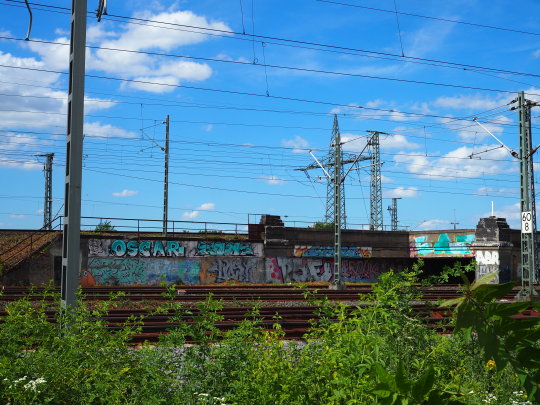
Bild des Tages: Am Ostbahnhof Offenbach
0 notes
Video
Stehen drei S-Bahn-Züge im Ostbahnhof by Pascal Volk
#Europe#Germany#Berlin#Berlin Friedrichshain-Kreuzberg#Friedrichshain#F'hain#Am Ostbahnhof#Gerüst#Scaffolding#Andamio#Ostbahnhof#S-Bahn#Wide Angle#Weitwinkel#gran angular#super wide angle#Superweitwinkel#ultra wide angle#Ultraweitwinkel#ww#wa#sww#swa#uww#uwa#Sommer#Summer#Verano#Canon EOS R5 Mark II#R5m2
1 note
·
View note
Text
19.06.2024 23:50
Hallo Ihr Lieben,
wie geht es euch? Ich hoffe gut! Mir geht es ganz okay. ich war heute Vormittag im Home-Office gewesen und musste dann leider ins Büro fahren, weil ich mein Ladekabel im Büro hatte. Ich muss mir angewöhnen das immer mitzunehmen das Kabel. Ansonsten war soweit alles gut. Bin dann schnell rüber zur Arbeit am Ostbahnhof gefahren. Hab beim Döner noch eine Dönerbox mit Hähnchen und Sauce gegessen. Das war sehr sehr lecker und sehr sehr gut. Dann bin ich auf Arbeit angekommen und habe dort noch gearbeitet. Zwar nicht so intensiv aber ich hab gearbeitet. Es war ganz okay. Aber das muss natürlich noch besser werden. Ansonsten ist soweit alles super. dann wieder zu unserem Döner gegangen zum Feierabend und hab eine türkische Pizza gegessen mit Salat Soße Hähnchen Fleisch und Käse außer Tomate und Gurke früh und dort kam das EM Spiel Deutschland gegen Ungarn. Hab die erste Hälfte geschaut mehr oder weniger. War ganz interessant. Aber ansonsten ist soweit alles super. Und ich brauch mir auch keine Gedanken machen. Ich bin ein gesunder Mensch und ich kann immer schlafen. Ich kann auch immer einschlafen und ich werde immer schlafen und ich werde auch immer einschlafen das ist alles gut ich bin gesund.
Schlaf gut ❤️
0 notes
Text

#sbahn #480560 als #s3 nach #erkner am #ostbahnhof
0 notes
Text

7812 230 im Berliner Ostbahnhof am 06.04.2025
#7812 230#Br7812#Br 7812#ICE4#ICE 4#ICE#Intercity Express#Ostbahnhof#eisenbahn#bahnhof#bahn#berlin#triebwagen#Berlin-Ostbahnhof#Berlin-Friedrichshain#Friedrichshain-Kreuzberg#Friedrichshain#Stadtbahn
17 notes
·
View notes
Text
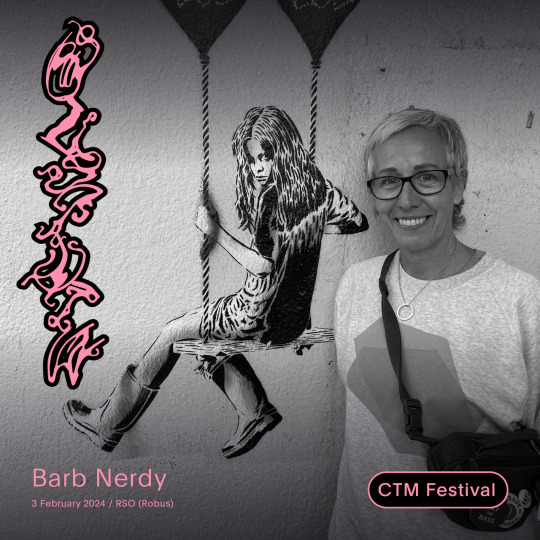
Playing for the CTM Festival was on my "bucket list" for a VERY long time. I have been there as a visitor, since back in the days, when it was happening at Maria am Ostbahnhof. And - obviously - it was a dream of me to play music for them. And this year it is happening. Thank you so much --> James! I will play the opening which means it will not be the usual "Abriss-Set" but still heavy bass with a lot of space. I love "vibing the room" as I call it. Playing in the beginning, everything is possible and no pressure to keep the speed. It's time to bring the lovely music I have in my library from artists like Ivy League, Aisha Devi or G Jones. And of course... there will be rave and Dschungel. The line-up for this night has still some empty places... some artists withdrew their appearance this year.. --> https://www.ctm-festival.de/festival-2024/programme/schedule/event/rso-night-robus
0 notes
Text
Nee aber anyway, ich bin am Wochenende in Berlin gewesen. Samstag früh hin, weil Freitag Abend hatt eich noch was vor, also Samstag schön früh los, weil Oma hat geburtstag und wir wollten den Tag zusammen verbringen. 6:10 Zug gebuch, Ankunft 10:16, dann noch 40 Minuten S-Bahn, so der Plan. 5 Uhr aufgestanden, 5:50 am Bahnhof. Die Feststellung, Zug fährt 6:22, ok noch schnell was zu essen holen, abe rnicht zu viel Zeit lassen, weil es könnte ja sein, dass der Zug unangekündigt doch pünktlich fährt und ich hab Sparpreis.
6:06 also mit Beute vom Bäcker zum Gleis, zeigt immer noch 6:22 an, ok nice, das ist ok. Lauf zum anderen Ende des Bahnsteigs, weil Sitzplatz reserviert. Schau auf die Anzeige dort: 6:42. Es ist Samstag, ich bin um 5 aufgestanden, es ist kalt.
Ich warte also. Hätte ich mir mal doch ne heiße Schokolade geholt. Und dann fängt es an, dass es immer mal wieder eine Minute hoch tickt. Es sollen innerhalb von 6 Minuten plötzlich 3 Fernzüge von dem Gleis fahren. Glaubt ihr ja wohl selber nicht.
ICE nach Hamburg Altona fährt dann auf dem Gleis gegenüber. 7:56 kommt dann auch mein Zug, ich bin seit einer Stunde bei 9 Grad am Bahnhof. Toller Start.
Ich überlege, mir im Boardrestaurant ne heiße Schokolafe zu kaufen. Ich will die Bahn aber nicht auch noch belohnen, also keine heiße Schokolade. Der rest der Reise geht erstaunlich smooth. Ich komme 40 Minuten später Berlin Hbf an.
Irgendwas mit den S-Bahnen ist seltsam. Meine wird angezeigt, in 15 Minuten, natürlich erst. Dann plötzlich nicht mehr. App sagt sie fällt aus. Ich kenn mich aus und suche ab einem anderen Bahnhof, da fährt sie. Ich steige in die nächte Bahn in die ungefähre Richtung.
Ich warte dann auf meinen Anschluss. In 6 Minuten, in 4 Minuten, in 3 Minuten.... immer noch in 3 Minuten? Keine Uhrzeitanzeige mehr, in 4 Minuten. Wow, irgendwann kommt sie. Mein Opa musste doch nur 5 Minuten länger warten, als in unserrem Gespräch Berlin Hbf besprochen, weil ich wusste ja, dass ich 15 Minuten warten muss.
Naja anyway, Rückfahrt dann heute, am Montag. Is ja Montag, wird nicht so voll sein. Ostbahnhof, sie bauen immer noch. Ein Abgang ist gesperrt, ich laufe zum Ende des Zugs, in der Hoffnung, dort einen Sitzplatz zu bekommen, reservierung hab ich gespart, is ja auch schon widder teurer geworden. 3 Minuten vor Einfacht des Zuges, 20 Minuten Verspätung, plötzlich. 10 Minuten später, Gleiswechsel, ich renne über den ganzen Bahnsteig, vorbei am gesperrten Abgang zum anderen Ende des Bahnsteigs, wechsel von 4 auf 6. Zug fährt tatsächlich ein. Pünktlich mit 20 Minuten verspätung. Kalt ist mir nicht, hab mir in weiser voraussicht im Backwerk eine heiße Schokolade geholt, erst ne Weile an meine Brust gedrückt und dann getrunken. Finde tatsächlich einen Sitzplatz.
Ankunft, etwa 30 Minuten zu spät. Woher kam die Verspätung? "Verspätete Bereitstellung des Zuges" aha, warum zum Fick? Der Zug fährt erst Ostbahnhof los. Da passiert eigentlich nicht viel davor, warum wurde er zu spät bereit gestellt.
Naja jedenfalls saß ich sogar im Ruheabteil, soweit so gut, so nach der Hälfte der Fahrt kommt eine Schaffnerin: "WILL NOCH JEMAMD EINEN KAFFEE? .... MÖCHTE JEMAND EINEN KAFFEE?... KAFFEE? .... MÖCHTE NOCH JEMAND EINEN KAFFE?" Ja sorry, vllt bin ich da bisschen pedantisch, aber ich sitze im RUHEABTEIL und ich will meine verdammte Ruhe haben, danke auch, geht weg mit eurem überteuerten Kaffee oder macht es LEISE.
Und als jemand der viel Zug fährt weiß ich, das ist eigentlich total in Ordnung, relativ entspannt, kaum saß ich im Zug, war eigentlich alles ok. Eigentlich kann man sagen, die Reise verlief gut. Aber das kann es doch nicht sein. Das war auch auf der Reise wieder eine Stunde. Das sind etwa 12% mehr Zeit, die ich gebraucht habe. Dazu kommt, dass ich natürlich mindestens ne S-Nahn 20 Minuten früher nehme, weil ich nciht riskieren will, den Zug zu verpassen. Und ich buche immer, wenn ich von meinen Eltern fahre, von deren Station, was ein paar € teurer ist, was ich nciht müsste, weil ich das Deutschland Ticket habe, aber wenn die S-Bahn mit drauf steht und ich wegen der meinen ICE verpasse, müssen die mich ja hoffentlich mit dem nächsten fahren lassen.
Anyway, hatte das Gefühl, dass mal rauszuschreiben, weil das was ich erlebt habe ist normal und das darf nicht normal sein.
Zum Vergleich, bis vor 15 Jahren ist meine Oma jede Woche zwischen Berlin und Duisburg gependelt, also selbe Strecke. 4 Jahre lang. Sie hatte einmal Verspätung. EINMAL. Nur falls sich jemand fragt, ob es sich nur so anfühlt, als wäre es schlimmer geworden.
Ich bin ja der Meinung, dass Züge regelmäßig ~20 Minuten, ~40 Minuten Verspätung haben ist ein nicht einhalten des Vertrags, den ich beim Ticketkauf geschlossen habe. Wenn ich einen Zug buche, mit dem ich 14 Uhr ankommen soll und 14:30 ankomme ist die vertragliche Leistung nicht erfüllt und ich muss meine Seite trotzdem erfüllen.
Wie oft ich Hotels buchen muss und frei nehmen muss, weil ich einen Tag früher irgendwo hin fahren muss, weil man sich nie darauf verlassen kann, dass man halbwegs pünktlich ankommt.
Erst ab einer Stunde Entschädigung bekommen und dann nur 25%, das geht nicht. Die Konsequenzen müssen krasser sein. Ab 20 Minuten muss das anfangen, ab 1 Stunde 50%, ab 2 Stunden 100% zurück.
Oh letzter Zug fällt aus? Glückwunsch DB ihr dürft jetzt eine Hotelübernachtung zahlen.
Die schlechte Leitung müssen starke Konsequenzen haben sonst haben sie keine Motivation was zu ändern.
212 notes
·
View notes
